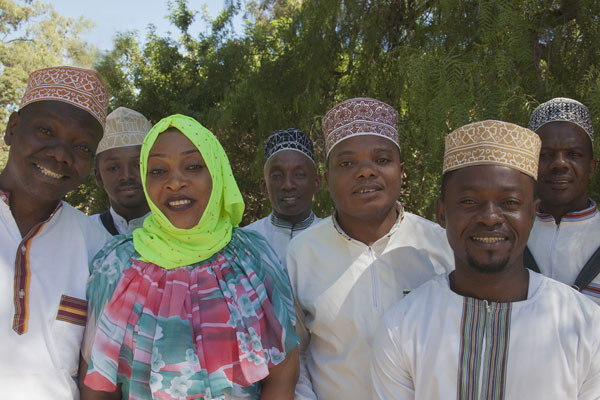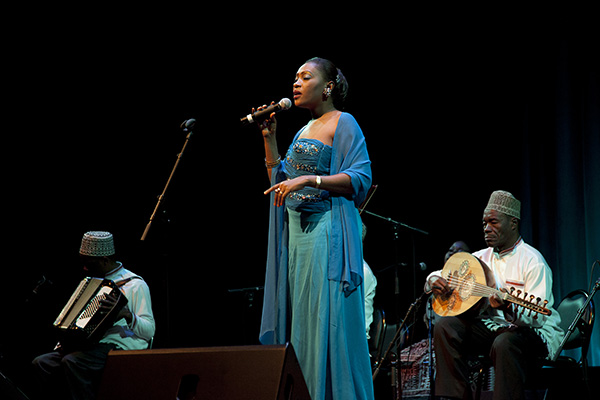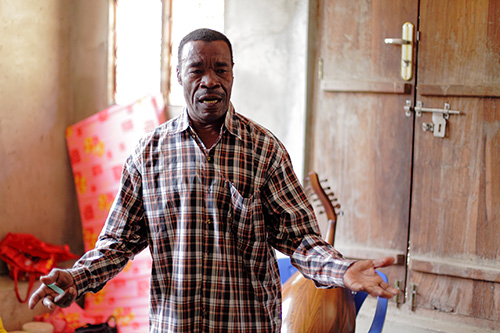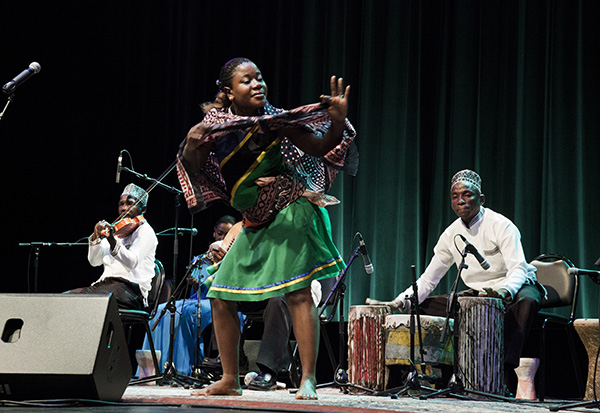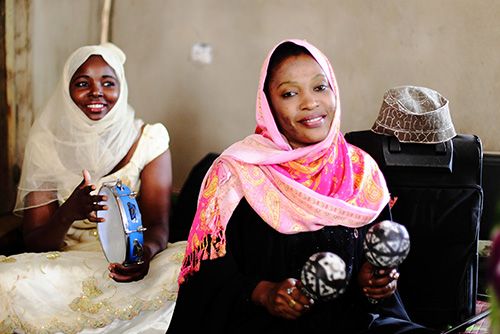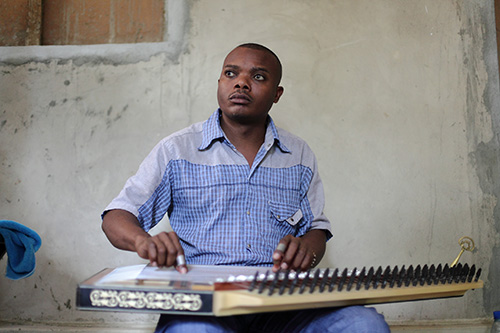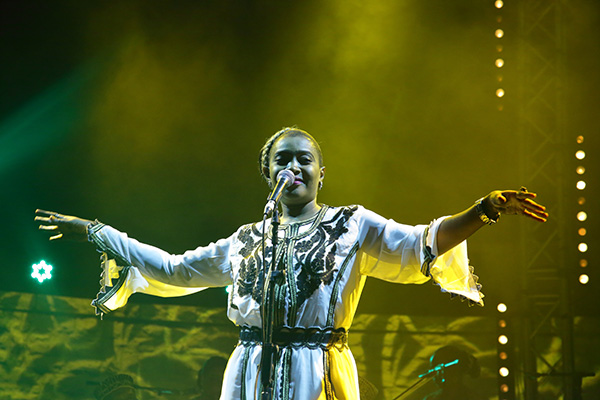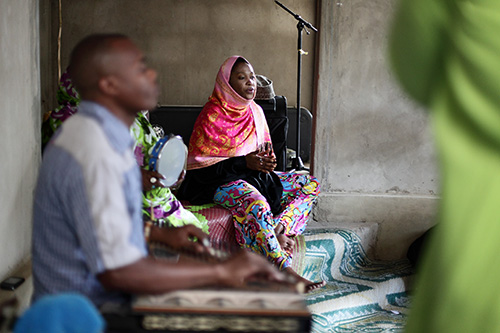RAJAB SULEIMAN & KITHARA
featuring Saada Nassor
Taarabmusic has defined Zanzibar's aural landscape for over a century, renowned for its lush mix of Arabic and western instruments, diva-worthy vocalizations, and allusive Swahili lyrics. The venerable and syncretic form is ambitiously renewed by Rajab Suleiman & Kithara. This lean and nimble group has uncovered the form's essential origins and is creating new musical conversations with its East African neighbors, historic Arabic cultural partners, and allied Western forms.
In the form’s heyday, taarab orchestras could include 60 or more musicians: violinists, singers, qanun, accordion, and oud players. During the last 20 years, synthesizers and drum machines displaced musicians. Virtuosity--and audiences--were lost.
To revive the form’s striking colors, Suleiman and a few younger players broke off from the venerable Culture Music Club in 2012 to form, a pocket orchestra capturing all the sonic specialties of acoustic taarabin an original, dynamic way. In uniting older and younger generations, Kithara’s musicians are reckoning passionately with the music’s Arabic and Ottoman underpinnings, calling out influences from Cuba to India, and welcoming Zanzibar’s ngoma folk rhythms and stories.
Suleiman started out as an accordion player, but was fascinated by the qanun and the central role the zither played in taarab. “In the beginning when I started to play and to learn the instrument, I almost gave up,” recalls Suleiman. “It was just so difficult to master. But then when I got to go to Egypt to study, I really fell in love with it and wanted to master all the intricacies. I was the youngest player ever to pick it up and the first to get a chance to study more outside the country.”
His adventuresome approach eventually sparked a renewed sound for the music, which shows Zanzibar’s striking blend of Arabic and eastern African cultures. An age-old stopover on trade routes between several continents, the island’s music continues to absorb new influences.
“I formed my own group because I needed to do music in a way different from the regulartaarab ensembles in Zanzibar,” he reflects. “The clubs that play the music have many members but they often go to the club as an evening pastime. It is a traditional way to dotaarabin Zanzibar, but there is little interest in change or innovation, and now the local audiences completely ignore the old taarabbecause of this.”
The ensemble explores the subtle beauty of maqamat, the system of modes and ornaments that drives Arab classical music, and pairs it with interweaving rhythms that are distinctly African. Sensual dance rhythms unfold to startling virtuosity on instruments like the qanunand oud, ney and accordion. Earthy yet nimble vocals by young up-and-coming star Saada Nassar touch delicately on life’s most pressing, universal matters.
“We use local ngomatraditions, the melodies and rhythms, and play them on taarab instruments most of which have come from elsewhere, though we have also made our own instruments like the sanduku, a kind of bass made from a wooden tea chest with an attached string,” Suleiman says. “Add to that the words, which are arranged in a very poetic way with strict numbers of syllables and rhymes. We talk about life in song, by alluding to something indirectly, to make our listeners ponder the meaning.”
“Zanzibar is an island where many people have come to live and trade for many centuries, so our music is a mix of African, Arab, Indian and also European influences,” Suleiman muses.”
Since joining Kithara in 2013 young up-and-coming singer Saada Nassor has become the Islands’ most talked about new vocalist. Saada grew up singing qasida in Quranic school and later become a member of her school’s choir. Prior to joining Kithara she has sung with a variety of Zanzibar’s modern taarab groups. Saada’s love however is with the old-school acoustic taarab: “In modern taarab everything is played at the loudest volume, and the singer has to go along in order not to be drowned out. The acoustic taarab and its instruments allow me to express myself and to use my voice in a much more intricate manner.”
The ensemble’s foundation is provided by Mohamed Hassan, Karama Abdallah, Foum Faki and Abdallah Fereji. Mohamed Hassan’s accordion grounds the group harmonically while Karama Abdallah adds the throb of ngoma-style bass playing. Percussionists Foum Faki and Abdallah double on a number of instruments including Zanzibari ngoma, vidumbak, as well as the more regular fare of dumbak, bongos and rika.
Kithara’s line-up is flexible and may be adapted to the desired sound and repertoire: They may perform as a 15 piece “Grand Orchestre Taarab de Zanzibar” offering all the splendors of traditional Zanzibari orchestral taarab, including several violins, nai, ‘ud, and a large chorus of backing singers. The orchestra and smaller editions of Kithara regularly feature Makame Faki, the doyen of Zanzibari male singers, and/or the revered female voice of Rukia Ramadhani. For a more dance-focused repertoire of ngoma and kidumbak the group has toured with a lineup of female dancers and backing singers
Kithara’s touring lineup for 2018/19 is:
- Rajab Suleiman – qanun, accordion, bandleader
- Saada Nassor – vocals, rika, backing vocals
- Mohamed Hassan – accordion, backing vocals
- Karama Abdalla – bass-guitar, percussion, backing vocals
- Foum Faki – dumbak, kidumbak, ngoma rika
- Abdallah Fereji – bongos, kidumbak, rika
- Ally Salim – nai, backing vocals
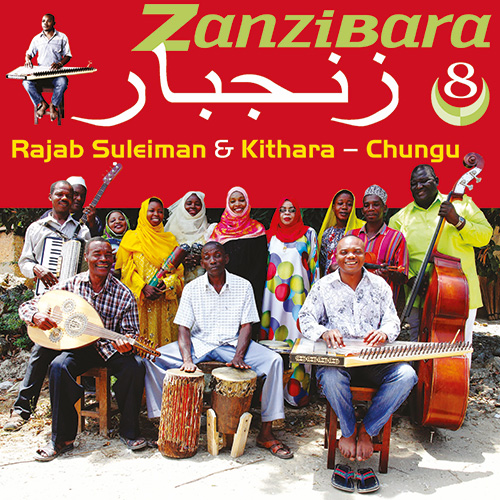
Kithara’s next European tour is planned for May 2019. For booking inquiries please get in touch with Yorrick Benoist at Run Productions. The group in various line-ups is also available on request all year round. For further information please contact Jahazi Media.


